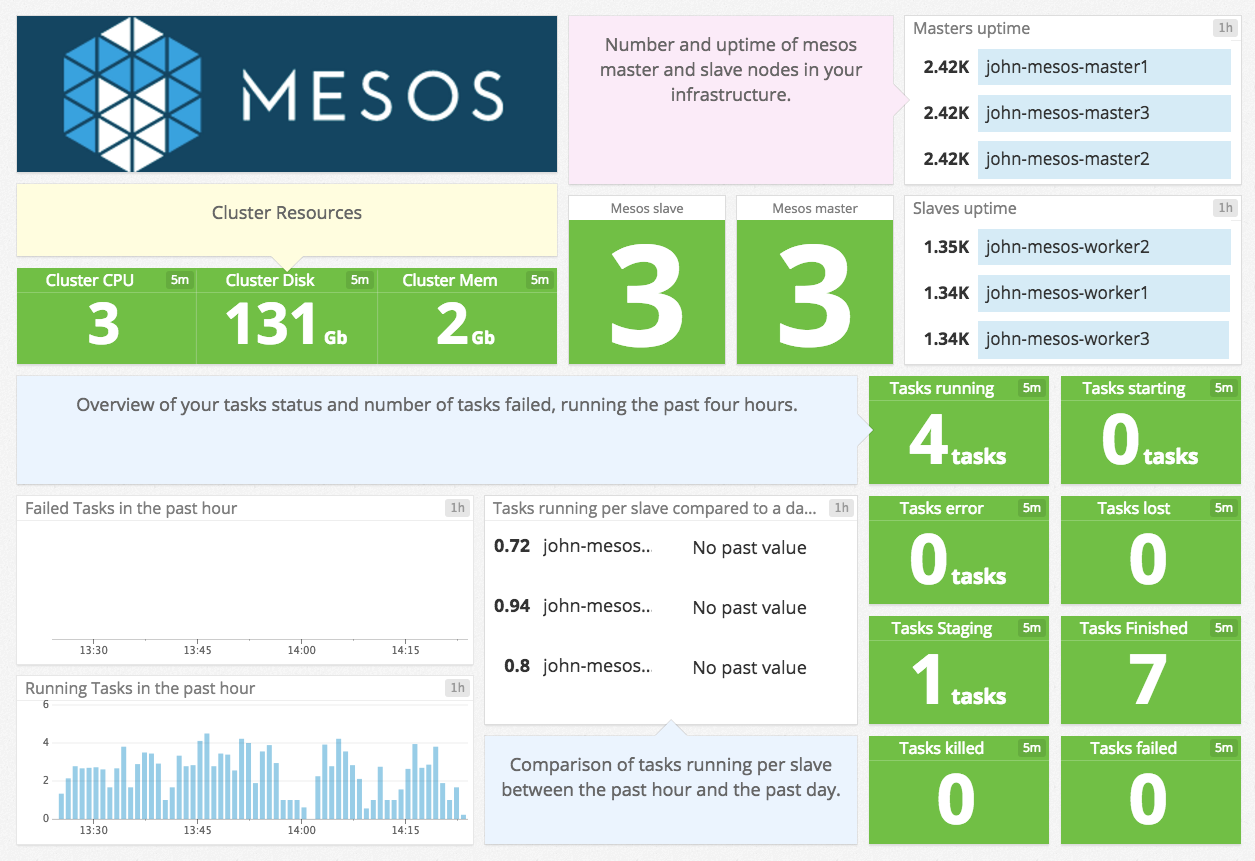This Agent check collects metrics from Mesos slaves for:
- System load
- Number of tasks failed, finished, staged, running, etc
- Number of executors running, terminated, etc
And many more.
This check also creates a service check for every executor task.
Follow the instructions in our blog post to install the Datadog Agent on each Mesos agent node via the DC/OS web UI.
- In the DC/OS web UI, click on the Universe tab. Find the datadog package and click the Install button.
- Click the Advanced Installation button.
- Enter your Datadog API Key in the first field.
- In the Instances field, enter the number of slave nodes in your cluster (You can determine the number of nodes in your cluster by clicking the Nodes tab on the left side of the DC/OS web ui).
- Click Review and Install then Install
If you are not using DC/OS, then use either the Marathon web UI or post to the API URL the following JSON to define the Datadog Agent application. You must change <YOUR_DATADOG_API_KEY> with your API Key and the number of instances with the number of slave nodes on your cluster. You may also need to update the docker image used to more recent tag. You can find the latest on Docker Hub
{
"id": "/datadog-agent",
"cmd": null,
"cpus": 0.05,
"mem": 256,
"disk": 0,
"instances": 1,
"constraints": [
["hostname", "UNIQUE"],
["hostname", "GROUP_BY"]
],
"acceptedResourceRoles": ["slave_public", "*"],
"container": {
"type": "DOCKER",
"volumes": [
{
"containerPath": "/var/run/docker.sock",
"hostPath": "/var/run/docker.sock",
"mode": "RO"
},
{ "containerPath": "/host/proc", "hostPath": "/proc", "mode": "RO" },
{
"containerPath": "/host/sys/fs/cgroup",
"hostPath": "/sys/fs/cgroup",
"mode": "RO"
}
],
"docker": {
"image": "datadog/agent:latest",
"network": "BRIDGE",
"portMappings": [
{
"containerPort": 8125,
"hostPort": 8125,
"servicePort": 10000,
"protocol": "udp",
"labels": {}
}
],
"privileged": false,
"parameters": [
{ "key": "name", "value": "datadog-agent" },
{ "key": "env", "value": "DD_API_KEY=<YOUR_DATADOG_API_KEY>" },
{ "key": "env", "value": "MESOS_SLAVE=true" }
],
"forcePullImage": false
}
},
"healthChecks": [
{
"protocol": "COMMAND",
"command": { "value": "/probe.sh" },
"gracePeriodSeconds": 300,
"intervalSeconds": 60,
"timeoutSeconds": 20,
"maxConsecutiveFailures": 3
}
],
"portDefinitions": [
{ "port": 10000, "protocol": "tcp", "name": "default", "labels": {} },
{ "port": 10001, "protocol": "tcp", "labels": {} }
]
}Unless you want to configure a custom mesos_slave.d/conf.yaml-perhaps you need to set disable_ssl_validation: true-you don't need to do anything after installing the Agent.
Under the Services tab in the DC/OS web UI you should see the Datadog Agent shown. In Datadog, search for mesos.slave in the Metrics Explorer.
If you are not using DC/OS, then datadog-agent is in the list of running applications with a healthy status. In Datadog, search for mesos.slave in the Metrics Explorer.
See metadata.csv for a list of metrics provided by this integration.
The Mesos-slave check does not include any events.
mesos_slave.can_connect:
Returns CRITICAL if the Agent cannot connect to the Mesos slave metrics endpoint, otherwise OK.
<executor_task_name>.ok:
The mesos_slave check creates a service check for each executor task, giving it one of the following statuses:
| Task status | resultant service check status |
| TASK_STARTING | AgentCheck.OK |
| TASK_RUNNING | AgentCheck.OK |
| TASK_FINISHED | AgentCheck.OK |
| TASK_FAILED | AgentCheck.CRITICAL |
| TASK_KILLED | AgentCheck.WARNING |
| TASK_LOST | AgentCheck.CRITICAL |
| TASK_STAGING | AgentCheck.OK |
| TASK_ERROR | AgentCheck.CRITICAL |
Need help? Contact Datadog support.
